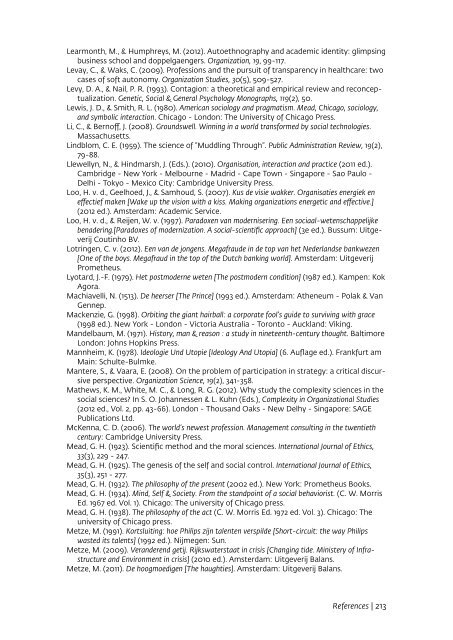Rumbling on performativity_Frits Simon
Rumbling on performativity_Frits Simon
Rumbling on performativity_Frits Simon
You also want an ePaper? Increase the reach of your titles
YUMPU automatically turns print PDFs into web optimized ePapers that Google loves.
Learm<strong>on</strong>th, M., & Humphreys, M. (2012). Autoethnography and academic identity: glimpsing<br />
business school and doppelgaengers. Organizati<strong>on</strong>, 19, 99-117.<br />
Levay, C., & Waks, C. (2009). Professi<strong>on</strong>s and the pursuit of transparency in healthcare: two<br />
cases of soft aut<strong>on</strong>omy. Organizati<strong>on</strong> Studies, 30(5), 509-527.<br />
Levy, D. A., & Nail, P. R. (1993). C<strong>on</strong>tagi<strong>on</strong>: a theoretical and empirical review and rec<strong>on</strong>ceptualizati<strong>on</strong>.<br />
Genetic, Social & General Psychology M<strong>on</strong>ographs, 119(2), 50.<br />
Lewis, J. D., & Smith, R. L. (1980). American sociology and pragmatism. Mead, Chicago, sociology,<br />
and symbolic interacti<strong>on</strong>. Chicago - L<strong>on</strong>d<strong>on</strong>: The University of Chicago Press.<br />
Li, C., & Bernoff, J. (2008). Groundswell. Winning in a world transformed by social technologies.<br />
Massachusetts.<br />
Lindblom, C. E. (1959). The science of “Muddling Through”. Public Administrati<strong>on</strong> Review, 19(2),<br />
79-88.<br />
Llewellyn, N., & Hindmarsh, J. (Eds.). (2010). Organisati<strong>on</strong>, interacti<strong>on</strong> and practice (2011 ed.).<br />
Cambridge - New York - Melbourne - Madrid - Cape Town - Singapore - Sao Paulo -<br />
Delhi - Tokyo - Mexico City: Cambridge University Press.<br />
Loo, H. v. d., Geelhoed, J., & Samhoud, S. (2007). Kus de visie wakker. Organisaties energiek en<br />
effectief maken [Wake up the visi<strong>on</strong> with a kiss. Making organizati<strong>on</strong>s energetic and effective.]<br />
(2012 ed.). Amsterdam: Academic Service.<br />
Loo, H. v. d., & Reijen, W. v. (1997). Paradoxen van modernisering. Een sociaal-wetenschappelijke<br />
benadering.[Paradoxes of modernizati<strong>on</strong>. A social-scientific approach] (3e ed.). Bussum: Uitgeverij<br />
Coutinho BV.<br />
Lotringen, C. v. (2012). Een van de j<strong>on</strong>gens. Megafraude in de top van het Nederlandse bankwezen<br />
[One of the boys. Megafraud in the top of the Dutch banking world]. Amsterdam: Uitgeverij<br />
Prometheus.<br />
Lyotard, J.-F. (1979). Het postmoderne weten [The postmodern c<strong>on</strong>diti<strong>on</strong>] (1987 ed.). Kampen: Kok<br />
Agora.<br />
Machiavelli, N. (1513). De heerser [The Prince] (1993 ed.). Amsterdam: Atheneum - Polak & Van<br />
Gennep.<br />
Mackenzie, G. (1998). Orbiting the giant hairball: a corporate fool’s guide to surviving with grace<br />
(1998 ed.). New York - L<strong>on</strong>d<strong>on</strong> - Victoria Australia - Tor<strong>on</strong>to - Auckland: Viking.<br />
Mandelbaum, M. (1971). History, man & reas<strong>on</strong> : a study in nineteenth-century thought. Baltimore<br />
L<strong>on</strong>d<strong>on</strong>: Johns Hopkins Press.<br />
Mannheim, K. (1978). Ideologie Und Utopie [Ideology And Utopia] (6. Auflage ed.). Frankfurt am<br />
Main: Schulte-Bulmke.<br />
Mantere, S., & Vaara, E. (2008). On the problem of participati<strong>on</strong> in strategy: a critical discursive<br />
perspective. Organizati<strong>on</strong> Science, 19(2), 341-358.<br />
Mathews, K. M., White, M. C., & L<strong>on</strong>g, R. G. (2012). Why study the complexity sciences in the<br />
social sciences? In S. O. Johannessen & L. Kuhn (Eds.), Complexity in Organizati<strong>on</strong>al Studies<br />
(2012 ed., Vol. 2, pp. 43-66). L<strong>on</strong>d<strong>on</strong> - Thousand Oaks - New Delhy - Singapore: SAGE<br />
Publicati<strong>on</strong>s Ltd.<br />
McKenna, C. D. (2006). The world’s newest professi<strong>on</strong>. Management c<strong>on</strong>sulting in the twentieth<br />
century: Cambridge University Press.<br />
Mead, G. H. (1923). Scientific method and the moral sciences. Internati<strong>on</strong>al Journal of Ethics,<br />
33(3), 229 - 247.<br />
Mead, G. H. (1925). The genesis of the self and social c<strong>on</strong>trol. Internati<strong>on</strong>al Journal of Ethics,<br />
35(3), 251 - 277.<br />
Mead, G. H. (1932). The philosophy of the present (2002 ed.). New York: Prometheus Books.<br />
Mead, G. H. (1934). Mind, Self & Society. From the standpoint of a social behaviorist. (C. W. Morris<br />
Ed. 1967 ed. Vol. 1). Chicago: The university of Chicago press.<br />
Mead, G. H. (1938). The philosophy of the act (C. W. Morris Ed. 1972 ed. Vol. 3). Chicago: The<br />
university of Chicago press.<br />
Metze, M. (1991). Kortsluiting: hoe Philips zijn talenten verspilde [Short-circuit: the way Philips<br />
wasted its talents] (1992 ed.). Nijmegen: Sun.<br />
Metze, M. (2009). Veranderend getij. Rijkswaterstaat in crisis [Changing tide. Ministery of Infrastructure<br />
and Envir<strong>on</strong>ment in crisis] (2010 ed.). Amsterdam: Uitgeverij Balans.<br />
Metze, M. (2011). De hoogmoedigen [The haughties]. Amsterdam: Uitgeverij Balans.<br />
References | 213



